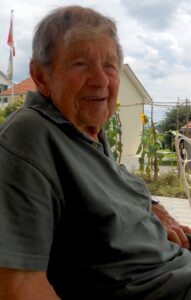I don’t remember when I met Edwin Tobler for the first time, but I can exactly remember where. It was during one of the festive lunches that followed the award ceremony of the Otto Paul Wenger Prize. I had the pleasure to sit at the table of honour with former prize winners and I was a little tipsy – more due to the honour than to the champagne. I had been talking for almost two hours with the friendly older man next to me when someone whispered in my ear: “You do realise that’s Edwin Tobler, don’t you?”
No, I didn’t! From soup to main course to dessert, not for a second did I imagine that I might sit next to one of the popes of Swiss numismatics! As always, Edwin Tobler was far too modest to talk about himself. He listened. That’s just how he was. A deep character, a man of outstanding knowledge who never considered himself important and never tried to impress others.
Confectioner, Tram Conductor – and a Collector of Highly Important Coins
Edwin Tobler was born in 1922 in St. Gallen. He was trained as a baker and confectioner and worked in this profession for several years in Sweden. When he came back, he found work in Zurich as a tram conductor.
Back then, a tram conductor used to be present at every ride on the tram. He sold tickets from his conductor’s bag and punched them.
He certainly didn’t make a lot of money with this job, even when Edwin Tobler rose in the hierarchy of the Zurich transport association and became calculator and chief accountant. Nevertheless, Edwin Tobler built up a coin collection of such importance that the collection is not only kept in a museum today but is distributed among several museums across Switzerland.
Rarities, Discoveries and the Dear Scholarly World
Edwin had already started collecting coins in Sweden. He acquired an enormous knowledge. He wasn’t interested in the value or the investment potential of a coin, but in its historical, economic and monetary significance. He didn’t leave it at putting coins side by side in a BEBA box, instead, he started to go to the archives, he examined the material there and learned to read the old handwritings. Many coin dealers must have been surprised about all the things this modest man knew about the coins on the trays.
Edwin Tobler used his knowledge to build a stunning collection of Swiss fractional coins with relatively little money. Until then, nobody had paid a lot of attention to those pieces. That’s why he was able to find unrecognised rarities and make scholarly discoveries. “Serious” scholars didn’t deal with such pedestrian things as contemporary coinage back then, therefore Edwin Tobler quickly became a valued expert and author since numerous collectors, in contrast to scholars, were interested in the same things as Edwin Tobler.
Let’s remember: collecting coins became a popular sport in the late 1960s. Many people that hadn’t known anything at all about coins until then entered the field. Most major coin fairs were founded at that time, and same is true for coin magazines such as MünzenRevue and MoneyTrend. They had a thick section with appraisals, and people used them to eagerly check every month whether their coins had increased or fallen in price. Furthermore, there was also a need for new literature for those among the new collectors that wanted to learn more. That’s why Jean-Paul Divo, who worked for Bank Leu’s numismatic department back then, convinced Edwin Tobler to write a book about the Swiss coins of the 19th and 20th century together with him.
Today, the book is known as “the” Divo-Tobler. The work was followed by two additional volumes on Swiss coins of the 17th and 18th century. Reliable coin dealers still refer to these works today.
He didn’t stop writing when the three books had been published. Edwin Tobler’s list of publications, which was published in the Schweizer Münzblätter on the occasion of his 70th birthday in August 1992, comprises four pages.
Those who see it for the first time might wonder who Hans Schweizer was, the man who wrote the early essays of the list. Well, Edwin Tobler was way too shy to publish the first of his “fundamental essays and books on Swiss coinage” – as the Historical Dictionary of Switzerland describes them – under his own name. He therefore adopted the pseudonym Hans Schweizer. This was typical of him, too: he didn’t choose a great artist’s name but limited himself to expressing by means of his name that he was nothing more than a simple Swiss man.
Anyone who reads his ingenious, excellently researched articles will acknowledge that he was much more. It tells a lot about his works that most of them were published in the HMZ or MoneyTrend, the leading collector’s magazines of Switzerland and Germany in the 80s. Only very few contributions of Edwin Tobler were published in scholarly journals like the Schweizer Münzblätter, and not a single one in the Schweizer Numismatische Rundschau! And this despite the fact that Hans-Ulrich Geiger praised him as “the renowned expert on Swiss fractional coins and contemporary coinage in general” in the brief congratulatory address on the occasion of his 70th birthday.
The Swiss Numismatic Society included his last work, which was published in 2008, in their series “Schweizer Studien zur Numismatik” [Swiss Studies on Numismatics]. In collaboration with Benedikt Zäch and Samuel Nussbaum, Edwin Tobler had written a comprehensive book about the work on the coinage history of St. Gallen that he had started in the 90s.

Always a Friendly Ear and Good Advice for Fellow Collectors
Edwin Tobler wasn’t one of those people who try to force their opinion on others. But those who asked him always received an open-minded, honest and well-informed answer. Edwin Tobler inspired many with his enthusiasm, and his friendly nature won over many people.
He died on 14 March 2020 at the age of 97. He fell asleep calmly and peacefully next to his beloved daughter Ursula. Our sympathy goes to her.
But, above all, there is an infinite gratitude. For everything that Edwin Tobler was and gave us.
Edwin, we will miss you.




